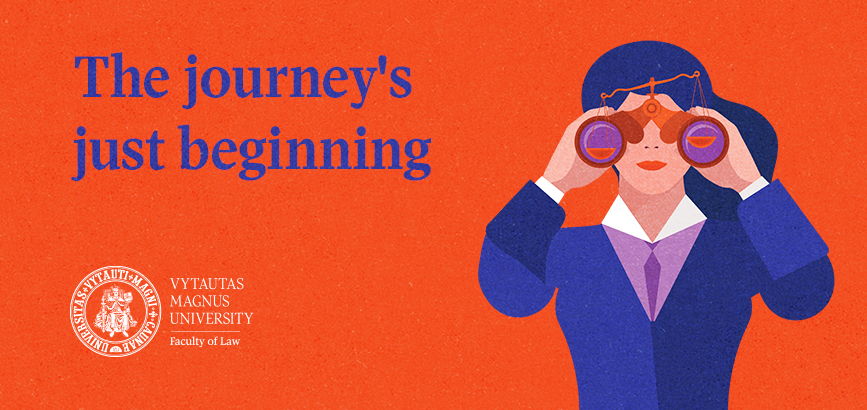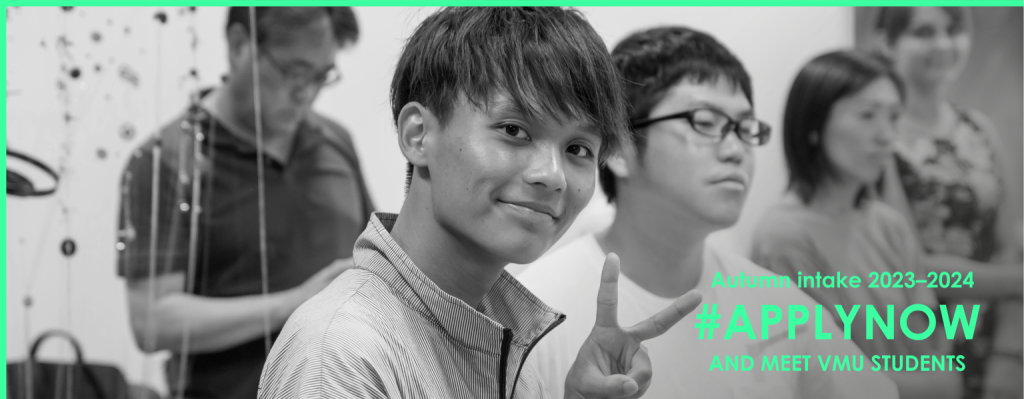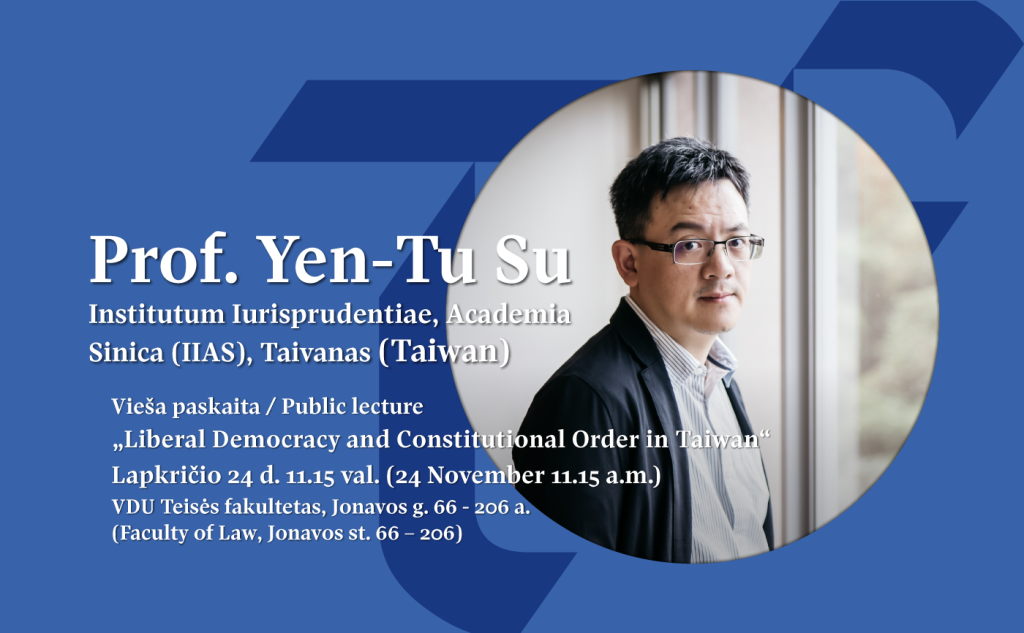Apply Now: Erasmus+ Studies in EU/EEA countries

VMU International Cooperation Department invites students to participate in the competition for ERASMUS+ STUDIES in EU/EEA countries for the Autumn or Spring semesters of the 2023/2024 academic year!
If you want to gain even more international study experience, improve your foreign language skills, become a VMU Ambassador and a part of even bigger international community, participate in the competition and fill in the online application form on https://epasirasymas.vdu.lt → Outgoing-Application for Erasmus Study Exchange (EU countries) until March 13th (23:59), 2023. For Music Academy students – until February 22nd (23:59), 2023.
Lists of the partner institutions: EVF / GMF / HMF / IF / KTF / MA / MF / PMDF / SMF / TF / ŠA / ŽŪA
Eligible applicants are all VMU students. Students with disabilities or special needs have an opportunity to receive additional funding.
The results of competition will be announced on March 23th (for Music Academy students – on February 27th) on VMU website. Each selected student will also be informed personally by e-mail.
Additional information about Erasmus+ studies, partnerships with Higher Education Institutions in foreign countries, criteria of the selection, scholarships, contacts:
- vdu.lt/en → Studies → Exchange studies → Erasmus+ exchange studies → Outgoing Erasmus+ exchange students → Studies in EU/EEA countries
- Individual consultations with International Programme’s Coordinators of the Faculties / Academies
- Students who are going to study at Transfrom4Europe alliance institutions (Saarland University; The Estonian Academy of Arts, University of Silesia in Katowice; Sofia University St. Kliment Ohridski) will receive additional 240 EUR one-time scholarship.
Admission to Degree Studies
APPLICATION DEADLINES:
- June 1 – for applicants from non-EU/EFTA countries that do not have Lithuanian Embassies in their countries
- July 1 – for applicants that are not required to obtain a national visa for arrival to Lithuania, as well as for non-EU/EFTA applicants with Lithuanian Embassies in their home countries
Public lecture “Liberal Democracy and Constitutional Order in Taiwan”
International Conference on Constitutionalism in Europe
On Friday 25 November, the VMU Faculty of Law, in collaboration with International Institute for Democracy and Electoral Assistance (International IDEA) and European Humanities University, is organising the international conference titled Constitutionalism in Europe: Current Challenges and Prospects for the Future.
Registration to the Conference (mandatory)
Webinar ID: 862 4242 3425 Passcode: 042864
The conference will take place at the VMU Small Hall (28 S. Daukanto g., Kaunas) and online via Zoom.
The event will be held in English and Lithuanian, with according interpretation.
Patron of the event – Law firm AMLEX
The conference is co-financed by the Lithuanian Research Council and the Ministry of Culture of the Republic of Lithuania
Background and objectives of the conference
The conference will mark three significant occasions: the 30th anniversary of the Constitution of the Republic of Lithuania, adopted on the 25th of October 1992, the 100th anniversary of the 1922 Constitution of the State of Lithuania, as well as the 100th anniversary of the University of Lithuania – the predecessor of Vytautas Magnus University.
The conference seeks to bring together leading researchers and practitioners to discuss the contemporary challenges to the European constitutional order, and the concepts and values of constitutionalism and assess national and supranational responses to these challenges. Learn more about conference speakers here.
Over the past years, countries in Europe and worldwide have faced new and diverse political, social, economic, and legal challenges. The COVID-19 pandemic, terrorism, migration, populism, illiberal democracy, authoritarianism, hybrid war, and other challenges continue to affect constitutionalism and the commitments to democracy, human rights, and the rule of law. To cope with current and future challenges, a review of comparative experiences at national levels is critically important for the development of a thorough understanding of the threats faced by constitutionalism, avoid constitutional backsliding and, instead, help ensure the expansion of the ideas and practices which sustain constitutionalism.
The topic of the conference will be addressed in three sessions by prominent speakers who are professors of constitutionalism and constitutional law, former constitutional justices, and practitioners. The first session will be dedicated to challenges that countries across Europe and worldwide have faced recently, and the relevant legal and institutional responses to them. The second session will focus on the opportunities and strategies for countering the erosion of democratic constitutionalism and fostering its future resilience in countries where democracies have undergone democratic backsliding. The third session will cover insights into the future of constitutionalism in Europe and worldwide. As a result, the conference will provide a unique opportunity to assess the state of constitutionalism in Europe and share a common vision for its future.
Session 1: Contemporary challenges to constitutionalism
This session will give an opportunity for the speakers to address specific challenges (including abusive constitutionalism, populism, authoritarianism, war, terrorism, migration, COVID-19 pandemic) which have recently been faced by the countries in Europe and worldwide. The speakers will reflect on how to safeguard constitutionalism in the context of contemporary challenges. How have the current challenges shaped the concept of constitutionalism in Europe and worldwide? How have these challenges affected methods of interpretation, legal doctrines and legal arguments about constitutional order in Europe and globally? Which impact have these challenges had on constitutional control? Have these challenges presented any opportunities for constitutionalism?
Furthermore, this session will provide an opportunity to discuss constitutionalism by looking through the lens of different countries in Europe and worldwide. The path of constitutionalism is unique in each country. It is shaped by the specific historical, political, social, and cultural situation. The experiences of different countries can help to identify the rise and fall of constitutionalism, learn from success stories and challenges, and use the valuable experiences in the future. Why do some countries succeed in the creation of constitutionalism while others do not? How can a country create successful constitutionalism and retain it? Which threats can arise along the path of constitutionalism and how to deal with them? The speakers of this session will have an opportunity to address these and other related questions.
This session aims to discuss constitutionalism not only from a European perspective but also from a broader context, i. e. to look at the experiences of Taiwan and the United States of America, to compare their and European stories of constitutionalism.
Session 2: Current challenges in rebuilding constitutionalism
In the course of history, we have seen opportunities to restore lost constitutional order. Some countries are making good use of these opportunities while other states are failing in rebuilding constitutionalism. Restoration of constitutionalism poses challenging questions. How does one restore a democratic constitutional order that has been lost? What challenges are faced in restoring constitutionalism? What are the main threats during the rebuilding of constitutionalism? How can the rebuilding of constitutionalism be encouraged? What role do other countries or international actors play in rebuilding constitutionalism? Which means do they have in use? This session of the conference aims to address these and other related questions. Special attention during this session will be paid to the experiences of Armenia, Belarus, Georgia, Moldova, and Ukraine.
Session 3: Future of constitutionalism
The final session seeks to summarize the main ideas discussed in the previous sessions and develop a comprehensive vision for the future of constitutionalism in Europe and worldwide. The session aims to elaborate on the following questions. Where does the current path of constitutionalism lead: to constitutional backsliding or constitutional progress? What are the main future challenges for constitutionalism? How will these challenges affect constitutionalism and our commitments to democracy, human rights, and the rule of law? How should we react to these future challenges? Which (legal) means do we have or should develop to respond to these challenges? What are the strengths and weaknesses of current constitutionalism? Should constitutionalism be reshaped? Should we talk about new features of constitutionalism? Are we entering a new historical epoch (phase) of constitutionalism?
Erasmus+ Traineeship Competition for any country the world
A competition is open for Erasmus+ student or recent graduate traineeship grants for traineeships in any country in the world. Application deadline is the 13th of November, 2022.
The placement period is from 2 to 6 months. Recent graduate traineeship must end – in a year after graduation.
Selection
All VMU full-time degree students who have not used more than 10 months of their Erasmus mobility (study/traineeship) period are eligible for the Erasmus grant.
Selection documents
For student traineeship (traineeship during student’s year of studies):
- Filled-in application form „Outgoing-Application for Erasmus Student Traineeship“
- Confirmation by the company or organization (obligatory).
Documents must be submitted online.
For recent graduate traineeship (application must be submitted during the last year of studies):
- Application form „Outgoing-Application for Erasmus Recent Graduate Traineeship “
- Confirmation by the company or organization (obligatory);
- Recommendation by a faculty member (obligatory).
The priority in the selection is given to:
- students whom traineeship is an obligatory part of their study programme;
- students who have never been Erasmus traineeship students before.
Selection criteria:
- student’s motivation;
- good knowledge of the language which will be used during the traineeship;
- student’s work, study, traineeship, participation in the international/academic projects, social activities experience in Lithuania and abroad;
- conformability between the chosen traineeship and student’s study programme;
- study results (first year MA students should attach transcript of records of their BA/MA degree to the application form).
Traineeship grants:
For EU and EEA countries:
| Country group | Country | Monthly scholarship size |
| Group I | Denmark, Finland, Iceland, Ireland, Luxembourg, Sweden, United Kingdom, Liechtenstein, Norway | 700,00 Eur |
| Group II | Austria, Belgium, Germany, France, Italy, Greece, Spain, Cyprus, Netherlands, Malta, Portugal | 650,00 Eur |
| Group III | Bulgaria, Croatia, Czech Republic, Estonia, Latvia, Lithuania, Hungary, Poland, Romania, Serbia, Slovakia, Slovenia, North Macedonia, Turkey | 600,00 Eur |
| Group IV | Switzerland | 700,00 Eur |
For Non-EU/EEA countries:
Scholarship is 700,00 Eur/month.
Travel grant (depends on the distance between sending and receiving institutions):
- 100-499 km – 180,00 Eur
- 500-1999 km – 275,00 Eur
- 2000-2999 km – 360,00 Eur
- 3000-3999 km – 530,00 Eur
- 4000-7999 km – 820,00 Eur
- More than 8000 km – 1500,00 Eur
Additional travel grants for green travelling options.
The competition results will be sent to every participant via e-mail.
More information:
Admission to Master program “International Business Law and Technologies”
Overview
This program is offered in response to the challenges posed by rapid digitalization and robotics to business law by combining relevant aspects of two branches/institutes of law – business and technology law.
The aim of the master’s study program is to prepare highly qualified masters of law who know the specifics of international business and technology law institutes and their interaction, are able to independently and critically analyze problems of the synergy of international business and technology law in the contexts of the development of artificial intelligence, changes in relevant legal science, globalization of business and legal environment (integrating articulation at the international, EU and national levels), to find and propose concrete solutions to complex international business situations, taking into account the latest theories of legal science and the requirements of professional legal ethics.
Career opportunities
Master in International Business and Technology Law provides multiple career paths and a variety of employment opportunities. Graduates can choose to work in different areas, including public and private sector, International and EU institutions, start their own business, or become a member of the regulated legal profession. Employers will value student’s broad and interdisciplinary knowledge in the complex synergy of business, law and technologies.
This degree entitles its holder (who also has the bachelor’s degree in law) to be a member of the regulated legal professions (such as judge, procurator, notary, attorney, bailiff, jurist, etc.)
The graduate has the right to enroll to the third cycle studies.
APPLY NOW
Feedback of lecturers and students
Feedback of students:
- Rza Mustafayev (Azerbaijan) – graduate of 2019 “Master’s degree at VMU was a turning point in my life with its amicable faculty members, matchless dedication to quality, and strong benevolent ties between university and students. These features combined with guest professors from well-known universities all over the world and affordable prices and scholarship opportunities for everyone make VMU an ideal destination to give your education an international shape. Despite having graduated I still keep in warm touch with all lecturers of the Law Faculty and benefit from valuable knowledge they have shared with me. Without exception, all lecturers are highly qualified specialists and made every effort to contribute to our personal and professional development.”
- Giorgi Katsitadze (Georgia) – graduate of 2020 “From the beginning of the studies I was convinced that I have made the best decision of my life by choosing this program. Lithuania was a great place to study because of its safe environment, cheaper living expenses, friendly, hospitable people, the scholarship and high-quality education provided by VMU, as well as the diploma, which is recognized worldwide and provides a lot of help in finding a good-quality job after graduation. I had an opportunity to get familiar with fellow peers from all around the world, with their culture and traditions, share experience and knowledge, make lifetime connections. I used this opportunity to introduce my own country and culture to the world’s future generation. The professors were always ready to assist, encourage and support innovative ideas presented by the students. VMU has friendly environment for everyone. Perfect technical support group and coherent online platform make studying process much more suitable. In addition to that, which was particularly impressive to me, every building has a history and heritage of the university merged harmoniously with modernity.”
- Irina Gorškova (Lithuania) – graduate of 2022 „I would like to express my gratitude to the lecturers of the program of VMU University, Faculty of Law for their high professionalism and competence, for their goodwill, patience and willingness to answer all students’ questions. I hope that many years of experience and sincere dedication to your work will help to further improve the spiritual and intellectual level of your new students. I would like to point out that the university has all the necessary conditions for the educational process. The acquired knowledge is useful in further professional activities”.
Feedback of lecturers:
- Lawyer, assoc. prof. Paulius Čerka: „International Business Law program is a very important phenomenon of today since daily lives of future lawyers can not be imagined without international legal elements. International Business Law studies are a great choice for those who aim to become effective lawyers in a rapidly changing world since this program grants opportunity to participate in the classes with the students from various cultures and backgrounds and solve legal problems in multi-cultural teams.“
- Lawyer, assoc. prof. Jurgita Grigienė: “I had great experience teaching in this program and working with the students who come from all over the world. I encourage you to choose the International Business Law program as you will not only learn how to apply the law in theory but also will get practical experience comparing different legal systems“.
- Prof. Charles Szymansky: „What’s unique about VMU’s Master’s program in law is that students learn how to think like a lawyer. It’s not just about memorization – while graduates obtain knowledge of the law, more importantly, they gain complex problem-solving skills that stay with them wherever their career paths will lead.“
Competencies acquired
Having completed the study program, graduates will be able to:
- analyze and apply in practice main legal acts, principles and case law regulating modern international business, technologies, and data protection in the contexts of national, EU and international comparative legal regulation, taking into account the latest legal science and related theories and requirements of professional legal ethics.
- initiate, organize, conduct and interpret scientific and applied research in modern international business and technology law at the national and international levels, applying specialized research methodologies, assessing their impact from a social and ethical point of view and presenting scientifically based conclusions.
- use national and foreign information sources, relevant databases, and modern technologies efficiently and productively in conducting research.
- independently identify problems of legal regulation in the field of international business and technology law and propose possible solutions, holistically evaluating various legal and scientific doctrines, international experience, following the imperatives of the protection of human rights and public welfare.
- independently model instruments for the regulation of legal relations and resolution of disputes that arise when smart technologies are used in international business law by analyzing and evaluating the activities of individuals in the context of the principles and provisions of law in accordance with scientific doctrine, interdisciplinary approach, international experience and requirements of professional ethics, is able critically assess the consequences and risks of decisions.
- present his / her attitude, knowledge and skills in native and second language fluently and reasonably in the context of modern international business and technology law, in different management levels, competencies and cultures, while respecting cultural and traditional diversity and demonstrating leadership skills.
- have a wide scope of interdisciplinary critical thinking, is able to apply skills acquired during studies and independent learning experience in the ever-changing context of globalization, taking responsibility for the development and strengthening of the legal profession, and is able to continuously study independently, by using acquired knowledge and skills in the practice of modern international business and technology law.
Contacts
| Faculty of Law (inquiries regarding study programme) |
| Contact person Giedrė Lukaševičienė, giedre.lukaseviciene@vdu.lt |
| Address Jonavos str. 66, Room 113, Kaunas 44138, Lithuania |
| Website https://teise.vdu.lt/en/ |
| International Cooperation Department (inquiries regarding application and admission) |
| E-mail studies@vdu.lt |
| Visiting Address V. Putvinskio g. 23, room 211, LT-44249 Kaunas, Lithuania |
| Mailing Address K. Donelaičio g. 58, LT-44248 Kaunas, Lithuania |
| Website www.vdu.lt/en/ |
| Facebook www.facebook.com/VytautasMagnusUniversity |
| Instagram www.instagram.com/vmuinternational/ |
Outgoing Students
ttention! Vytautas Magnus University has announced a new possibility for VMU students to attend short term courses and summer schools abroad with VMU Mobility Scholarship!
Short term courses and summer / winter schools are the exclusive possibility for VMU students to visit other country, get to know its culture, gain various skills, learn or improve the foreign language and receive the certificate with the awarded credits.
VMU full-time degree students are welcome:
- Check the offers of short term courses and summer / winter schools abroad:
- Choose the best options which offer the credits.
- Make sure that:
- the courses do not overlap your study period at VMU;
- you have enough time for documentation (check the deadline of hosting institution).
- Submit the online application form (Outgoing-Application for Short Term Courses and Summer/Winter Schools) by proving the motivation.
Applications will be accepted before the 15th day of each month.
VMU Selection Committee evaluates the academic results and applications of the candidates. The Committee announces the selection results before the 15th day of the next month.
VMU Faculty of Law scholars start implementation of Jean Monnet project
During the period of 1-09-2017 – 31-08-2020 VMU Faculty of Law scholars will be implementing the project for creation of module „EU CRIMINAL LAW AND POLICY“, project number 585318-EPP-1-2017-1-LT-EPPJMO-MODULE.
The project, after the successful approval of application, is co-funded by the Erasmus+ Programme of the European Union.
You can find more information about the project here.

Jay Erstling was named a Minnesota Attorney of the Year
Visiting Professor Jay Erstling was recently named a Minnesota Attorney of the Year for his work creating a patent pro bono program that helps low-income independent inventors obtain patent protection for their inventions. The program, which is called the LegalCORPS Inventor Assistance Program, was the first of its kind in the United States. With the help of the United States Patent and Trademark Office, It is now being expanded to provide legal representation to low-income inventors throughout the country. Jay Erstling is a professor on the faculty of William Mitchell College of Law in St. Paul, Minnesota, and he is also Of Counsel at the Minneapolis intellectual property law firm of Patterson Thuente Pedersen.
Opportunity to Earn U.S. LL.M. Degree in Half the Time and at Half the Price
Texas Tech University School of Law in Lubbock, Texas is one of the International Student Exchange Partners with whom the Vytautas Magnus University is affiliated. Students that participate in the Exchange Program with Texas Tech can now take advantage of an Advanced Standing program implemented by Texas Tech, which allows such participants to qualify for an LL.M. degree in half of the time that would normally be required and at half the cost.
Texas Tech University is a comprehensive research university with more than 100 master’s degree programs and fifty doctoral programs. Their Master of Laws (LL.M.) in U.S. Legal Studies is a two-semester, 24-credit program designed for foreign law graduates interested in a formal program of study of the U.S. legal system. One of the innovative features of the program is their “Advanced Standing” admissions system in which they allow Vytautas Magnus University exchange students to apply up to twelve credit hours of law-school coursework completed while an Exchange Student towards a future LL.M. degree. When combined with Texas Tech’s very competitive tuition rate of $18,756, Vytautas Magnus University students can earn an LL.M. degree with only one additional semester of study and pay as little as $9,378.
Vytautas Magnus University students that have not attended Texas Tech’s Exchange program can still take advantage of their Advanced Standing admissions system, but only for a maximum of 6 credits (one-fourth of the required credits for an LL.M. degree). Vytautas Magnus University students who do not participate in the Texas Tech Exchange Program, but who have taken courses in American Law at Vytautas Magnus University or another approved institution can request that they be given as much as 6 credits of advanced standing towards the 24-credits required for award of an LL.M. degree. In this case the cost of the LL.M. would be approximately $15,067.
The attached document explains the details of Texas Tech’s Advanced Standing program in more detail, and you can also find the information at: http://www.law.ttu.edu/acp/academics/LLM/Scholarships/#advance
Students interested in participating in Texas Tech’s Semester Exchange Program or interested in pursuing an LL.M. in the United States are encouraged to visit their website (www.law.ttu.edu/llm) or contact them directly at the following email address: LLM.law@ttu.edu
Download a poster here.


















